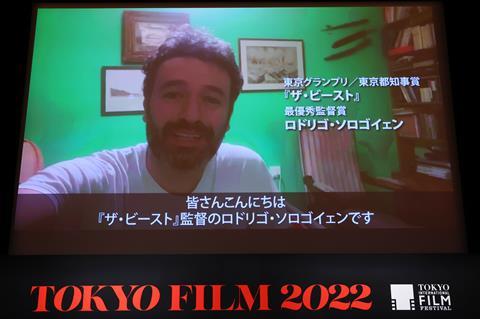
Spanish-French rural thriller The Beasts has won a hat-trick of awards at Tokyo International Film Festival (TIFF), including the Tokyo Grand Prix, best director for Rodrigo Sorogoyen and best actor for Denis Menochet.
The winners were announced at the closing ceremony of TIFF’s 35th edition in the Ginza district of Tokyo this evening (November 2).
The Beasts is a psychological thriller starring Ménochet and Marina Foïs as a French couple who settle in a remote Galician village to run an organic farm but whose arrival is seen as a threat to the villagers way of life. It marks the fifth feature of Spanish director Sorogoyen and received its world premiere at Cannes before going on to play festivals such as San Sebastian, where it won an audience award.
The Tokyo Grand Prix includes a cash prize of $20,400 (¥3m) while Sorogoyen and Ménochet will each receive just over £2,000 (¥300,000) with their awards.
TIFF’s special jury prize and $4,400 (¥500,000) in prize money went to Houman Seyedi’s Iranian drama World War III. It follows an ordinary labourer — played by Mohsen Tanabandeh (A Hero) — who finds himself working on the set of a film that purports to be a condemnation of dictatorships, but the filmmakers themselves turn into tyrants. It previously won best film and actor for Tanabandeh when it premiered at Venice Horizons in September and is Iran’s submission for the 95th Academy Awards.
The best actress award went to Spain’s Aline Kuppenheim for her role in Chilean drama 1976, in which she plays an upper middle-class woman who has a secret awakening during the early years of Chilean dictator Augusto Pinochet’s regime. Directed by Manuela Martelli, it premiered in Directors’ Fortnight at Cannes.
The festival broke with tradition for its best artistic contribution prize – usually awarded to an individual – by honouring Sri Lankan human trafficking drama Peacock Lament, directed by Sanjeewa Pushpakumara. The audience award went to Japanese filmmaker Rikiya Imaizumi’s languid drama by the window, in which a man ponders what to do about his wife’s affair.
A further surprise was that no winner was deemed worthy to receive the Amazon Prime Video Take One Award. Now in its second year, the award is open to filmmakers in Japan who have not yet worked in commercial film and a dedicated jury considered short films from seven finalists.
However, veteran director and jury president Yukisada Isao told the assembled audience: “The Amazon Prime Video Take One Award is a dream come true that gives new directors a chance to bring their films to life. It’s unfortunate that we couldn’t find a winner. Each piece has its merit, but many didn’t connect with the world. None of the works took imaginative leaps. Although they might not be worthy of an award, I hope these finalists will someday be recognized.
“It’s not the case that nothing was worthy, there were works that showed a promising future, and I would like to mention Yo Enen’s The Refrigerator Thief, which had a certain spark. But there was a clear difference in ability between last years and this year’s directors. Amazon Studios should work with creators who have listened to harsh opinions, and we hope that this result will lead to a winner of the award next year.”
Asian Future, Lifetime Achievement
In the Asian Future competition, for up-and-coming Asian filmmakers who have directed up to three features, the best film award went to Mohammadreza Vatandoust’s Iranian drama Butterflies Live Only One Day. The award includes a cash prize of $6,800 (¥1m).
The international jury was led by US director Julie Taymor, best known for biopic Frida and her stage adaptation of The Lion King, alongside Japanese cinematographer Yanagijima Katsumi, Korean actress Shim Eun-kyung, Portuguese director Joao Pedro Rodrigues and former director of the Institut Français du Japon Marie-Christine de Navacelle.
The closing ceremony also saw a lifetime achievement award presented to Nogami Teruyo, in recognition of her extraordinary career and contributions to Japanese cinema. She is best known for having worked with acclaimed auteur Akira Kurosawa, beginning with Rashomon in 1950 and participating in all his subsequent films including Seven Samurai (1954) and Ran (1985) - with the exception of The Idiot in 1951 – serving as a script supervisor and production manager.
The 95-year-old was presented her award on-stage by TIFF chairman Ando Hiroyasu and a bouquet of flowers by Stephen Woolley, the UK producer of the festival’s closing night film, Living, based on Kurosawa’s 1952 Japanese drama Ikiru (on which Teruyo worked as a script supervisor).
Festival figures boost
The 35th edition of TIFF marked the first full-scale physical edition of the festival in three years due to the Covid-19 pandemic.
Running for 10 days from October 24 to November 2, a total of 59,541 admissions were recorded, up 202% on the 29,414 admissions reported in 2021. The festival comprised 169 films, up from 126 last year.
A relaxation in travel restrictions meant 104 international guests attended the festival, compared to just eight in 2021, while 157 events featured a guest appearance – up from 65 events in 2021.
TIFFCOM, the festival’s affiliated content market, remained online and ran from October 25-27.
TIFF closes today with a screening of Oliver Hermanus’ UK drama Living, starring Bill Nighy.
35th Tokyo International Film Festival award winners
Tokyo Grand Prix: The Beasts
Special Jury Prize: World War III
Best Director: Rodrigo Sorogoyen, The Beasts
Best Actress: Aline Kuppenheim, 1976
Best Actor: Denis Menochet, The Beasts
Best Artistic Contribution: Peacock Lament
Audience Award: by the window
Asian Future Best Film Award: Butterflies Live Only One Day






![The Brightest SunScreen[Courtesy HKIFF]](https://d1nslcd7m2225b.cloudfront.net/Pictures/274x183/3/5/0/1448350_thebrightestsunscreencourtesyhkiff_312678.jpg)


















No comments yet